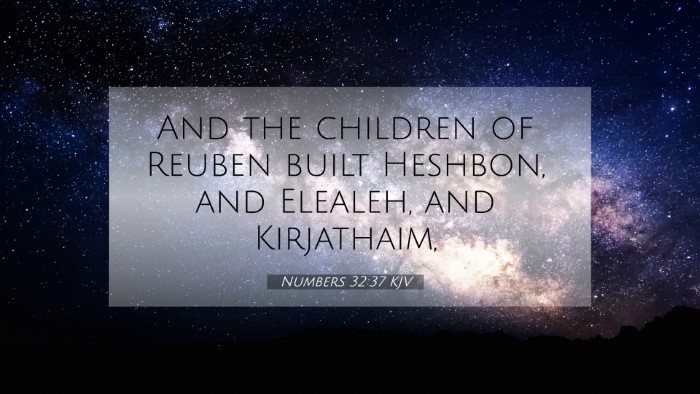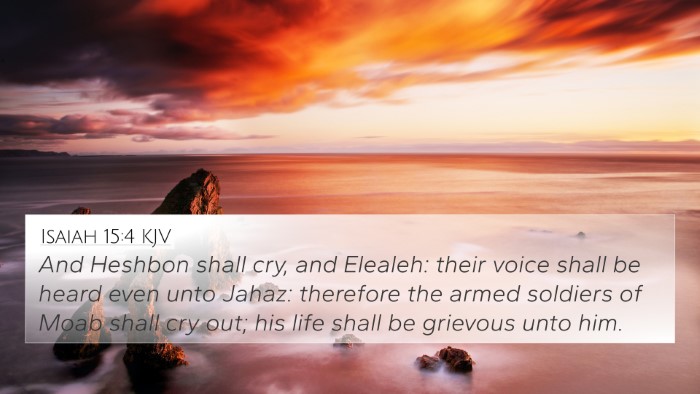Understanding Numbers 32:37
Numbers 32:37 states, "And the children of Reuben built Heshbon, and Elealeh, and Kirjathaim." This verse provides insight into the actions of the tribes of Reuben, depicting their commitment to establishing settlements in the land promised to them. The significance of this verse lies in its portrayal of faithfulness and the fulfillment of God's promises to His people.
Contextual Summary
This verse is set within a larger narrative where the Israelites, after years of wandering in the wilderness, are on the verge of entering the Promised Land. The tribes of Reuben and Gad sought to settle in the land east of the Jordan River, and this verse records their initiative in building cities for themselves, emphasizing their desire to take possession of the land.
Commentary Insights
-
Matthew Henry's Commentary: Henry reflects on the importance of dedication to God’s commands and the necessity of establishing a community aligned with spiritual values. The construction of these cities symbolizes their commitment to living out the promised land’s covenantal obligations.
-
Albert Barnes' Notes: Barnes emphasizes that the act of building cities showcases the desire of Reuben to organize their new life and settle down, which underscores the significance of preparation in the pursuit of God’s promises.
-
Adam Clarke's Commentary: Clarke provides historical context, noting that these cities were strategically located and that their establishment demonstrates foresight and planning by Reuben, aligning with God’s instructions to occupy the land.
Thematic Connections
This verse connects with broader themes in the Bible about land, belonging, and God’s faithfulness. The act of settlement is not just a physical endeavor but also a spiritual metaphor for finding one's place in God's plan.
Bible Verse Cross-References
- Numbers 21:32 - Discusses Israel's conquest of the land.
- Deuteronomy 3:12-13 - Explains the division of the land among the tribes.
- Joshua 13:15 - Further describes the inheritance given to the tribe of Reuben.
- Joshua 1:13 - Highlights the importance of remembering God’s promises when settling the land.
- Hebrews 3:18 - Reflects on the theme of entering God’s rest, paralleling the physical rest in land.
- Psalms 78:68-69 - Refers to God choosing the tribe of Judah and establishing Zion; relates to the significance of chosen lands.
- 1 Chronicles 5:11 - Chronicles the descendants of Reuben and their settlements.
Deepening Understanding through Cross-Reference
Understanding Numbers 32:37 requires a thoughtful exploration of how it interacts with related scriptures. This exploration considers the implications of land ownership, community building, and the responsibilities of the Israelites as they settle into their promised inheritance.
Exploration of Cross-Referencing in the Bible
Cross-referencing Biblical texts is a method of uncovering deeper meanings and connections within scripture. For example, linking Numbers 32:37 with Deuteronomy 3:12-13 shows the historical context of Reuben's inheritance while reinforcing God’s promise to the nation of Israel.
Applying Cross-Referencing Techniques
By utilizing tools for Bible cross-referencing, such as Bible concordances or specific cross-reference guides, one can identify significant themes that resonate across different books within the Bible. This approach allows readers to uncover the intricate tapestry of God's dealings with His people.
Conclusion
Numbers 32:37 serves as a critical verse illustrating the realization of God's promises in the lives of the tribes of Israel. Through the lens of public domain commentaries, it is clear that these cities hold not only political and social significance but also spiritual relevance in understanding divine faithfulness throughout biblical history. By engaging in comparative Bible verse analysis and cross-referencing relevant scriptures, believers can draw richer insights from their studies and cultivate a deeper connection with biblical teachings.





